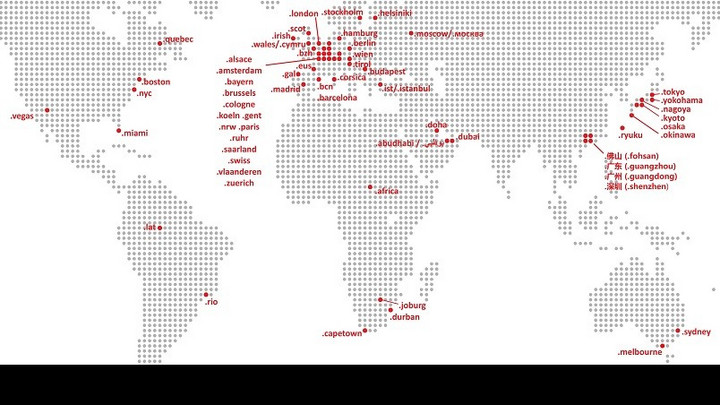Mapping Virtual Space to the Geographical Environment
New geographical domain names allow companies, governments and individuals to identify their online presence with a certain regional community. Dirk Krischenowski, from dotBERLIN, explores how these are governed.

Map of GeoTLDs
The introduction of new domain extensions (so-called top-level domains) like .berlin, .nyc or .swiss by the Internet’s administrative organization ICANN has been long awaited by cities, regions and language and cultural communities.
In 2013, for the first time in the history of the Internet, new top-level domains which correspond to the names of cities and regions were approved by ICANN. As a result, domain name registrars worldwide are offering Internet addresses in the eight German geographic endings .bayern, .berlin, .hamburg, .koeln / .cologne, .nrw, .ruhr and .saarland.
Germany is the pioneer and leader in the global development towards GeoTLDs and the world's first publically available geographic domain extension, .berlin, came from Germany. ICANN expects dozens of other cities and regions from many other countries to follow this path and apply for their extension in the next 5-10 years.
All geographic top-level domains (GeoTLDs) have to get the permission of the relevant government(s) to operate the respective geographic string. The string could be the full name of a place (e.g. .sydney), a short form of the name (e.g. .rio), a common or official abbreviation (e.g. .bzh or .bcn), a translation to a foreign language (e.g. .cologne or .tokyo) or any other kind of association with the place name.
The operation of GeoTLDs by the Registry Operator, which is the organization that was contracted by ICANN to operate a GeoTLD, touches various areas of Internet governance. These areas are the subject of the paper “Mapping Virtual Space to the Geographical Environment” (Read the complete paper "GeoTLDs and Internet Governance").
GeoTLDs harnessed by the multi-stakeholder community
Following the successful introduction of the new geographic domain extensions, the first interim results indicate that their use by different local authorities follows different concepts of governance. While a few are governed more openly, like .com, and some are restricted, like .gov, the majority operate in a multi-stakeholder manner involving the local authorities, business associations, cultural groups, and citizens.
Comparing the domain registrations per inhabitants, those GeoTLDs that are merely operated by private organizations are more successful than those operated by the local government. This mirrors the experience in ccTLDs where business-driven extensions like .de have contributed much more to the country’s identity than those strongly influenced by the government like .fr or .it.
GeoTLDs in the context of digitization, smart city and e-government
Meanwhile it is indisputable that new extensions have considerable potential for the communication of authorities with businesses and citizens in the context of digitization, smart city and e-government. They enable a significant improvement in the communication and findability of e-government services through Internet addresses which are brief and descriptive and which the target groups can very well remember (for example, www.gewerbeanmeldung.hamburg).
The new Internet addresses also provide a unified infrastructure for the digital connection of business and citizens to services of the administration and others, and can thus make an important contribution to improving the awareness and use of e-government services.

Some GeoTLDs
Want your own GeoTLD? Start planning now
Other cities and regions which are also interested in introducing their own domain ending have to be patient for the moment. ICANN has not yet set a specific timetable for a further round of applications. However, in view of the complexity inherent in the entire application procedure for a new domain ending, local authorities are well advised to discuss early on possible operating models and the financing possibilities for their own future domain ending.
Please note: The opinions expressed in Industry Insights published by dotmagazine are the author’s own and do not reflect the view of the publisher, eco – Association of the Internet Industry.



